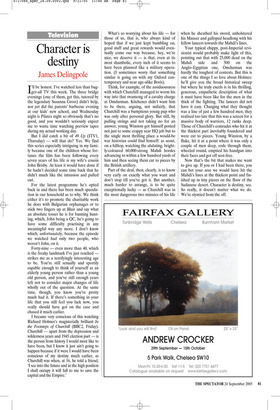Character is destiny
James Delingpole
I’ll be honest. I’ve watched less than bugger-all TV this week. The three bridge evenings (one of them, get this, tutored by the legendary Susanna Gross) didn’t help, nor yet did the parents’ barbecue evening at our kids’ new school, and Wednesday night is Pilates night so obviously that’s no good, and you wouldn’t seriously expect me to waste time watching preview tapes during my actual working day.
But I did catch a bit of 49 Up (ITV1, Thursday) — will that do? Yes. We find this series especially intriguing in my family because one of the children whose fortunes the film has been following every seven years of his life is my wife’s cousin John Brisby. At least it would have done if he hadn’t decided some time back that he didn’t much like the intrusion and pulled out.
For the latest programme he’s opted back in and there has been much speculation in our household as to why. We think either it’s to promote the charitable work he does with Bulgarian orphanages or to stick two fingers up at Blair and say what an absolute tosser he is for banning hunting, which, John being a QC, he’s going to have some difficulty practising in any meaningful way any more. I don’t know which, unfortunately, because the episode we watched had only two people, who weren’t John, on it.
Forty-nine — even more than 40, which is the freaky landmark I’ve just reached strikes me as a terrifyingly interesting age to be. You’re still sexually and sportily capable enough to think of yourself as an elderly young person rather than a young old person, and you’ve still enough years left not to consider major changes of life wholly out of the question. At the same time, though, you know you’ve pretty much had it. If there’s something in your life that you still feel you lack now, you really should have got on the case and chased it much earlier.
I became very conscious of this watching Richard Holmes’s magisterially brilliant In the Footsteps of Churchill (BBC2, Friday). Churchill — apart from the depression and wilderness years and 1945 election part — is the person from history I would most like to have been, but I know it just ain’t going to happen because if it were I would have been conscious of my destiny much earlier, as Churchill was when, at 16, he told a friend, ‘I see into the future and in the high position I shall occupy it will fall to me to save the capital and the Empire.’ What’s so worrying about his life — for those of us, that is, who always kind of hoped that if we just kept bumbling on, good stuff and great rewards would eventually come our way because, hey, we’re nice, we deserve it — is that, even at its most shambolic, every inch of it seems to have been planned like a military operation. (I sometimes worry that something similar is going on with my Oxford contemporary and near age-alike Boris).
Think, for example, of the assiduousness with which Churchill managed to worm his way into that swansong of a cavalry charge at Omdurman. Kitchener didn’t want him to be there, arguing, not unfairly, that Churchill was a bumptious young pup who was only after personal glory. But still, by pulling strings and not taking no for an answer, young Winston got himself posted not just to some crappy rear HQ job but to the single most thrilling place a would-be war historian could find himself: as scout, on a hilltop, watching the ululating, brightly-coloured 60,000-strong Mahdi hordes advancing to within a few hundred yards of him and then seeing them cut to pieces by the British artillery.
Part of the deal, then, clearly, is to know very early on exactly what you want and don’t stop till you’ve got it. But another, much harder to arrange, is to be quite exceptionally lucky — as Churchill was in the most dangerous two minutes of his life when he sheathed his sword, unholstered his Mauser and galloped headlong with his fellow lancers towards the Mahdi’s lines.
Your typical chippy, post-Imperial revisionist would probably make light of this, pointing out that with 25,000 dead on the Mahdi side and 500 on the Anglo–Egyptian one, Omdurman was hardly the toughest of contests. But this is one of the things I so love about Holmes: he’ll give you the broad historical sweep but where he truly excels is in his thrilling, generous, empathetic description of what it must have been like for the men in the thick of the fighting. The lancers did not have it easy. Charging what they thought was a line of just a few hundred men, they realised too late that this was a screen for a massive body of warriors, 12 ranks deep. Those of Churchill’s comrades who hit it at the thickest part inevitably foundered and were cut to pieces. Young Winston, by a fluke, hit it at a point where it was only a couple of men deep, rode through them, wheeled round, emptied his handgun into their faces and got off scot-free.
Now that’s the bit that makes me want to give up. If you or I had been there, you can bet your arse we would have hit the Mahdi’s lines at the thickest point and finished up in tiny pieces on the floor of the Sudanese desert. Character is destiny, see. So really, it doesn’t matter what we do. We’re stymied from the off.
































































 Previous page
Previous page